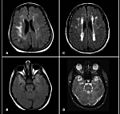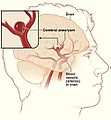Cerebrovascular disease facts for kids
Cerebrovascular disease is a group of conditions that affect the blood vessels in your brain. Think of it like a problem with the "roads" that carry blood and oxygen to your brain. When these blood vessels are damaged, your brain might not get enough oxygen.
This can lead to serious issues like a stroke or a mini-stroke. A stroke happens when blood flow to part of the brain is stopped. Sometimes, it can also be a stroke caused by bleeding in the brain. These problems can sometimes affect a person's memory and thinking skills.
Contents
What Causes Cerebrovascular Disease?
Cerebrovascular disease happens when the blood vessels in your brain get damaged or blocked. Here are some common reasons why:
- Atherosclerosis: This is when fatty stuff builds up inside your arteries, making them narrow and hard. It's like rust building up in a pipe.
- Embolism: This is when a small clot or piece of something travels through your blood and gets stuck in a brain artery, blocking it.
- Aneurysms: Sometimes, a blood vessel wall can become weak and bulge out like a balloon. If this balloon bursts, it can cause bleeding in the brain.
- Low blood flow: If your heart isn't pumping blood strongly enough, your brain might not get all the blood it needs.
What Increases the Risk?
Some things can make it more likely for someone to develop cerebrovascular disease. These are called "risk factors" and many of them can be managed:
- High blood pressure: When your blood pushes too hard against the walls of your arteries.
- Smoking: Chemicals in tobacco can damage blood vessels.
- Obesity: Being very overweight can put extra strain on your heart and blood vessels.
- Diabetes: This condition affects how your body uses sugar, which can damage blood vessels over time.
How Is Cerebrovascular Disease Treated?
Treatments for cerebrovascular disease aim to prevent strokes and other problems, or to help people recover from them. Treatments often involve a mix of things:
Medications
Doctors might prescribe different medicines to help:
- Antiplatelets: These medicines, like Aspirin, help stop blood clots from forming.
- Blood thinners: Medicines like Heparin or Warfarin make your blood less likely to clot.
- Blood pressure medicines: These help lower high blood pressure.
- Anti-diabetic medicines: These help manage blood sugar levels for people with diabetes.
Lifestyle Changes
Making healthy choices can make a big difference:
- Eating healthy foods.
- Getting regular exercise.
- Not smoking.
- Keeping a healthy weight.
Surgical Procedures
In some cases, surgery might be needed to fix blood vessels or prevent future strokes. These procedures can include:
- Endovascular surgery: Doctors use tiny tools and cameras to work inside blood vessels.
- Vascular surgery: This involves repairing or replacing damaged blood vessels.
Notable People Affected
Many people, including famous figures, have been affected by cerebrovascular disease:
- Walter Cronkite (1916–2010), a well-known American news journalist.
- Roberts Blossom (1924–2011), an American actor and poet.
- Shirley Hufstedler (1925–2016), an American judge and the first United States Secretary of Education.
Images for kids
See also
 In Spanish: Enfermedad cerebrovascular para niños
In Spanish: Enfermedad cerebrovascular para niños
 | Lonnie Johnson |
 | Granville Woods |
 | Lewis Howard Latimer |
 | James West |



